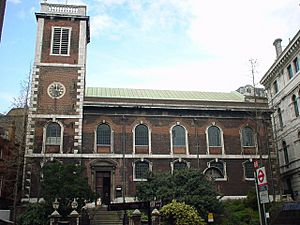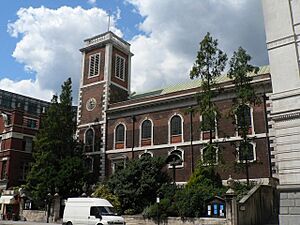St Andrew-by-the-Wardrobe facts for kids
Quick facts for kids St Andrew-by-the-Wardrobe |
|
|---|---|

Exterior photo of St Andrew-by-the-Wardrobe
|
|
| Location | London, EC4 |
| Country | England |
| Denomination | Church of England |
| Previous denomination | Roman Catholicism |
| Churchmanship | Traditional Catholic |
| Website | https://www.standrewbythewardrobe.org/ |
| Architecture | |
| Heritage designation | Grade I listed building |
| Architect(s) | Sir Christopher Wren |
| Style | Baroque |
| Administration | |
| Diocese | London |
St Andrew-by-the-Wardrobe is a historic Church of England church. It is located on Queen Victoria Street, London, in the City of London. You can find it close to Blackfriars station. This church also serves as the London home for the Coptic Orthodox Church. They share the building with the Coptic Orthodox Archbishop of London, Archbishop Anba Angaelos.
Contents
History of St Andrew-by-the-Wardrobe
This church was first mentioned around the year 1170. It was likely built much earlier than that. In the 1200s, the church was part of Baynard's Castle. This was an old royal home.
The Royal Wardrobe Connection
In 1361, King Edward III moved his Royal Wardrobe nearby. The Royal Wardrobe was a special storehouse. It held royal items like weapons and clothing. Because of this, the church got its unique name.
Fires and Rebuilding
Both the Wardrobe building and the church were destroyed in the Great Fire of London in 1666. After this huge fire, Sir Christopher Wren designed 51 new churches. St Andrew-by-the-Wardrobe was one of his simpler designs. It was finished in 1695.
The church was badly damaged again during the London blitz. This happened when German planes bombed London during World War II. Only the tower and walls were left standing. The church was rebuilt and opened again in 1961.
The Church Today
Today, the parish of St Andrew-by-the-Wardrobe follows a tradition. In this tradition, only men can become priests. Because of this, it receives special guidance. This guidance comes from the Bishop of Fulham, who is currently Jonathan Baker.
The St Gregorios group of the Indian Orthodox Church also holds regular Sunday services here.
The Church Building
St Andrew's church sits on a raised area. It looks out over the street below. Its simple red-brick outside looks different from the stone buildings around it. Inside, the church has open spaces on the sides. These areas are supported by strong pillars.
Most of the church's original inside parts were ruined during the war. Many of the features you see now came from other churches. These churches were also destroyed by bombs. For example, the weathervane on the steeple came from St Michael Bassishaw. That church was taken down in 1900.
The pulpit, which is where the priest gives sermons, came from St Matthew, Friday Street. The font, used for baptisms, also came from there. The royal arms, which show the symbols of the House of Stuart, came from St Olave Old Jewry. That church was mostly demolished in 1887.
There is a statue of St Andrew from around 1600. It stands on the north side of the special area called the sanctuary. There is also a unique statue of Saint Anne. She is shown holding the Virgin Mary, who in turn holds the Christ child. This statue is probably from northern Italy and dates to around 1500.
William Shakespeare's Connection
The famous writer William Shakespeare lived in this area for about fifteen years. He worked at the Blackfriars Theatre nearby. Later, he even bought a house in the church's parish. To honor him, a special memorial was placed in the church.
The church was named a Grade I listed building on January 4, 1950. This means it is a very important historic building.
Notable Clergy
- Guy Treweek was the priest in charge from 2011 to 2015. He is married to Rachel Treweek, who was the first female bishop in the Church of England.
- Luke Miller has been the rector since 2016. He was the priest in charge from 2015 to 2016.
Images for kids
See also
 | James Van Der Zee |
 | Alma Thomas |
 | Ellis Wilson |
 | Margaret Taylor-Burroughs |



